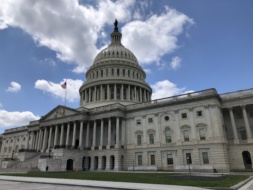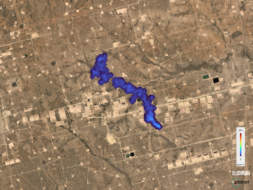Commercial EO providers contribute to sectors ranging from agriculture to climate monitoring to defense—and now they’re banding together to make sure policymakers know the results of an administration-ordered study could put all of that in jeopardy.
The conflict: The terrestrial mobile industry, aka cell phones, are seeking to use a large band of spectrum for 6G connectivity. But government and commercial EO providers already use the top part of that band for downlink of Earth imagery.
This X-band is particularly well-suited for EO data downlink, and losing exclusive access to it could result in the EO industry facing interference and limited growth, according to industry officials.
Decisions, decisions: On the global stage, this issue will be debated and decided at the 2027 ITU World Radiocommunication Conference.
Domestically, industry is facing a shorter timeline. The National Spectrum Strategy released in November directed the National Telecommunications and Information Administration to study whether the band of spectrum from 7,125 MHz to 8,400 Mhz could be reallocated and used for other purposes, though the strategy noted that the band includes “a variety of mission-critical Federal operations.”
EO on the offense: EO providers want to be sure that the ongoing study doesn’t ignore the commercial operations in the band and focus only on federal missions.
“Access to X-band is a significant issue facing EO providers today that almost no one knows about—and we’re working hard to change that,” James Mason, Planet’s chief space officer, said in a statement to Payload. “Through our ongoing advocacy and educational campaigns on the Hill and beyond, we’re demonstrating that not only is X-band the only globally-harmonized EO downlink spectrum with a robust equipment ecosystem, but that we also take great pride in our efficient shared use of the band with both government and commercial systems.”
“We look forward to furthering our work with regulators to ensure new and existing policies help continue to foster the innovation and expansion that’s so critical to our industry and the many applications it underpins,” he continued.
Primary docs: The industry’s education of policymakers includes a white paper drafted in July that argues against reallocating the 7,125-8,400 MHz band to other users. Some of the contributors to the paper, which has been circulated around policymakers, include Airbus, ICEYE, Kongsberg Satellite Services, Leaf Space, Planet, Spire, and Umbra.
“X-band is a lifeline to the Earth Observation sector, with no current viable alternative,” the paper says.
Note to Congress: The Spectrum and National Security Act, which was introduced in April, also directed study of this same band of spectrum. Though the legislation has seemingly been preempted by NTIA already beginning its study, a coalition of EO providers has urged Congress to explicitly direct the study to include commercial EO entities in addition to federal missions.





